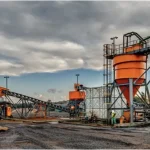In February 2024, Zambian President Hakainde Hichilema described the initiative to link the country’s copper mines with a port in Angola as a “once-in-a-lifetime” opportunity. This U.S.-supported project, also backed by the European Union and the G7, involves constructing new railway tracks in Zambia to connect with existing lines in Angola.
Additionally, in October 2023, the European Union formed a partnership with Zambia and the Democratic Republic of Congo to enhance raw material supply chains and rail infrastructure. These developments are poised to expedite the export of Zambia’s minerals and metals, shortening shipping times significantly and optimizing the supply chain.
The strategic relevance of metals and minerals essential for energy transition is rising, attracting considerable international investment into Zambia’s mining industry, which is the nation’s primary economic driver. Zambia, a significant copper producer, is ideally positioned to play a pivotal role in green energy, underscored by the European Commission’s designation of copper as a critical mineral in the recently adopted Critical Raw Minerals Act.
President Hichilema has ambitious plans to more than triple Zambia’s annual copper output to over three million tonnes by 2032, working in collaboration with foreign investors. This strategy has alleviated concerns about potential resource nationalism.
Given the capital-intensive nature of mining and the long-term profit expectations, it remains crucial for foreign investors to secure robust investment protections, especially considering the persistent political risks.
Investment Protection Measures:
Firstly, investors should verify whether an active bilateral investment treaty (BIT) exists between Zambia and their country. Zambia’s notable BITs include agreements with Mauritius and the Netherlands—both preferred jurisdictions for channeling investments into Africa. Investors can secure BIT protections either by initiating investments through these jurisdictions or restructuring existing investments to include entities from these jurisdictions, provided no disputes are impending.
Past Investment Disputes:
Zambia faced a significant investment dispute when Kansanshi Mining Plc initiated an ICSID arbitration in June 2020, concerning its copper-gold mining operations. This dispute was amicably settled in September 2023.
Regulatory Environment:
Recent fiscal reforms in Zambia have seen adjustments in the taxation landscape, including non-refundable sales taxes replacing VAT and heightened royalties. While the state has moved away from overt resource nationalism, the upcoming 2026 presidential elections could reignite nationalist policies.
Investors must remain vigilant, monitoring regulatory changes and maintaining dialogue with governmental bodies to mitigate risks associated with state intervention.
Strategic Recommendations for Investors:
- Preventive Measures: Utilize BIT protections preemptively to deter potential disputes.
- Dispute Resolution: In the event of a dispute, BITs generally provide a pathway to international arbitration without requiring additional consent from the state.
- Financial Strategies: Consider third-party funding for legal claims to minimize impact on operational finances. This non-recourse funding covers legal costs in exchange for a share of any favorable judgment or settlement.
- Enforcement of Awards: Successful arbitration may lead to substantial damages. If necessary, investors might enforce these awards against the state’s non-immune assets held internationally.
By implementing these strategies, investors can safeguard their interests in Zambia’s promising mining sector amid the global push towards sustainable energy sources.















